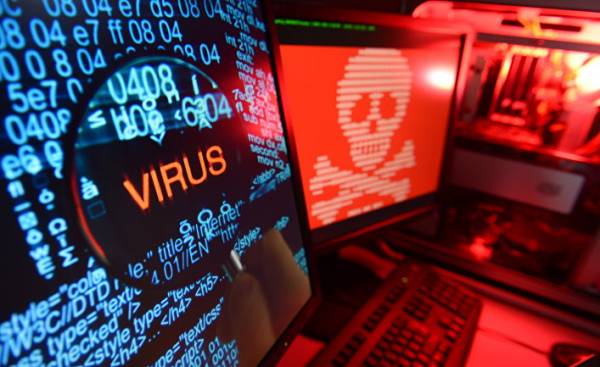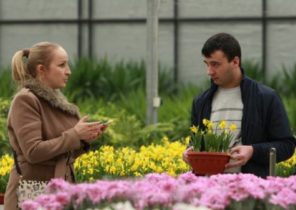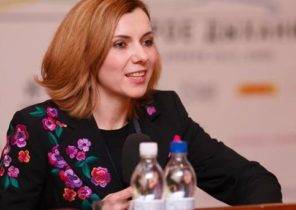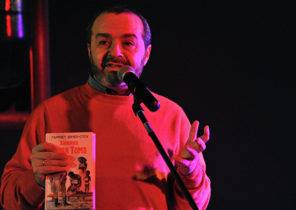
Three man in dark glasses who are seated at a table in one of the street cafes of Kiev, not like someone who wants someone to spoil a quiet life. They ordered whiskey with ice, joking that drinking it is safer than the Ukrainian cognac, and does not stand out compared to other visitors who came to have lunch under the shade of blooming chestnut trees.
However, looks can be deceiving. “We are many and we are called the Cyber Alliance. We, hackers, are capable of many things”, — represents a group of its speaker. He operates under the alias Shawn (Sean), and what are his words this year in my own skin learned Russian billionaire Konstantin Malofeev and his Belarusian colleague Alexander Usovsky.
In late February, Shawn with his colleagues hacked page Usovskogo in social networks and e-mail, copying the content. Soon, this data appeared on the Internet. So all interested could look at the world that is kept secret even more than the work of hackers. It is all done in order to exert political influence in some European countries as the main objective is the elections. Very soon the consequences of such actions may feel and the Czech Republic.
Belarusian Union
Alexander Usovsky seems to be a very busy man. “Now I’m going to the Czech Republic. But I have little time. I am writing a new history book, and part of the materials you have in your archives,” he wrote to his new page on Facebook. The original page is still in the hands of the Ukrainian hackers, and Usovsky not have access to it.
“At first he was not our goal, says Sean. — We wanted to get to the people who work in various Pro-Kremlin think tanks. They spread lies about Ukraine and part of Russia’s war against us. We wanted to know more about them. By coincidence, he was in one of the centers, so we left.” Until Usovsky was known to the public as a Belarusian writer who does not hide that he supports Russian President Vladimir Putin.
Apart from his literary activities, Usovsky earned by selling wine, and from time to time conduct tours for the few tourists who come to Belarus. But in fact he had another, hidden, face. It became known thanks to the Kiev criminals. Usovsky, as we know today, performs several tasks at the same time and kept in secret at least in the four Central European countries. In the Czech Republic, he maintained ties with the Stalinists, and in Poland — with the ultra-nationalists, which tried to influence political events in the interests of Moscow.
We all know that this kind of activity is the prerogative of the Russian special services, however, the story of Alexander Usovskogo confirms that the important role in the game, where at stake is the hearts and minds of the Europeans, play and different mediators, such, for example, the Belarusian writer. Their activities are difficult to link directly with the Russian government, but these people help to export Russian national interests, including through a chain of other volunteers in the aforesaid countries.
People from high-rise buildings
Specifically Usovsky paid them money billionaire Konstantin Malofeyev, a man who is close to Russian President Vladimir Putin. In 2014 Usovsky received from Malofeeva hundred thousand euros. In the Czech Republic, for example, a portion of these funds Usovsky decided to give the Communist policy Ladislava the Kashuk, who has attracted the attention of public actions in support of the Russian war in Ukraine. Usovsky noticed Kashuk in social networks, where he published photos from their events. “You need money for flags and banners?” — appealed to the Usovsky Kashuk in one of the emails. The Kashuk was just preparing another demonstration in Prague against the “fascists in Kiev” and agreed to take the money.
Soon, on his account received seven thousand crowns. Usovsky explained the origin of the money, calling them part of its fee for the book about Stalin. Followed by a new translation (this time just over ten thousand) for the acquisition camera to the Kashuk can appeal to a wide audience. Usovsky regularly sent reports about their work in Russia colleagues Malofeeva. From these reports it follows that the support for the demonstrations against Kiev was not the most important item in their plans.
First Usovsky touted attracted to them Kashuk, a man who lives in one of the graffiti-covered, high-rise buildings in Melnik and works as a security guard at a supermarket on the outskirts of Prague. Usovsky described him as a talented organizer, an intelligent and brave man. However, the Kashuk never played a special role in politics, so I hope that Usovsky to communicate with him, was very exaggerated. But for some reason Usovsky believed that the Kashuk is a good candidate to head the Communist party KSČM, because it is more radical than its current leadership. At the end of 2014 staff Malofeeva instructed Osowska “prepare clear, specific and realistic plan for the transition of power to the Pro-Russian forces”.
Usovsky suggested to create a new political party that would unite disparate groups other Pro-Russian activists like Kasuki. This party, in particular, sought to be out of the Czech Republic from the European Union. Usovsky wrote about the Czech Republic as a promising country and it was assumed that among the Czech population, there are at least 15% of those who favor closer ties with Russia. Such ambitious goals he set and in neighboring Poland. Usovsky wanted to move in the Polish Parliament of their people. He mentioned ten Pro-Russian politicians whose election could arrange. But then the plans began to crumble.
The question is deferred
At rallies Kasuki come not so many people, and instead to stand at the head of the Communists, he quarreled with them and left the party. And in may of last year nationalist politician Mateusz Piskorski, favorite Usovskogo in Poland, was arrested on suspicion of espionage in favor of Russia.
Supporting them, Usovsky also created for his political activities false Foundation and opened an office in Bratislava. However, these “institutions” were not almost any activities. Belarusian asked the billionaire Malafeev new tools, explaining that without them it is impossible further progress. But Osowska refused. “I don’t understand what happened. At first I was patted on the shoulder, and now, they say, wait in the hallway, your question is delayed. I have in Poland, the Czech Republic and Slovakia there are Pro-Russian movement who are working like clockwork, and tomorrow can stand on the barricades. That’s only budget I have is not” — complained Usovsky in a letter to one colleague.
The reasons for these “delays” can be several. Billionaire Bruno eventually realized that Usovsky promises more than capable of doing. The Belarusian could “postpone” part of the money for themselves. When the desired results have been achieved, cash flow is blocked. Its role could play and fight of forces in the Kremlin, where the fore people that don’t support the oligarch and his staff, including Usovskogo. It is also assumed that Malofeev is gradually reoriented their work from Central Europe to the Balkans. In 2016 he was allegedly involved in the failed attempt of the Pro-Kremlin coup in Montenegro.
Did Usovsky last a bet on the Kashuk in the Czech Republic and some people in Poland, it is not clear. The Kashuk doesn’t want to talk about it, and Usovsky vague claims that “kept in touch with many Czechs”, and what happens in the Czech Republic “many times.” But with whom exactly he was dealing, Usovsky did not specify. “I’m not a spy,” he says. He describes himself as a patriot who volunteered to fight with the “primitive Russophobia” in Central Europe.
Too weak
It is well known that the Czech Republic is important for Putin because of its strategic position in Central Europe and membership in NATO and the EU. The Russian security services let in the Czech Republic roots and are constantly trying to interfere in politics, involving its employees. “As elections are approaching, in the Czech Republic you can expect to enhance the activity, Moscow led in other countries. It is, above all, about the spread of misinformation and the influence on politics and the media”, — commented the employee of the National Security Agency (NSA) and expert in the field of security John Schindler. The activities of such people as Usovsky is just one of the ways to achieve goals.
The most telling example of that might look like interference in elections, can be considered to be presidential battle in the US last year. It was a multi-level secret operation. Its aim was not only to eliminate candidate Hillary Clinton, who is critical of the Kremlin. The campaign, coordinated by Putin, was supposed to help win Donald Trump configured to Russians more positively and had a clear common goal — to weaken the West in the interests of Russia.
From the information that is already managed to the American intelligence agencies and the journalists that participated in the operation counterintelligence of the FSB and military intelligence, the GRU. With spies collaborated several groups of hackers, and they stole from different computers, documents, subsequently discredited politicians. For conspiracy as intermediaries hired other hackers who helped to publish those documents.
Some of them were published in the famous WikiLeaks server, and, in addition, they have published the American media mainstream. A full understanding of what pulls the strings of the Kremlin, was not, and no one was particularly elaborate operation. Presidential candidate Clinton and her Democratic party correctly assessed the importance of not only the fastest possible response to attack, but cyber protection at all. A large part of the donations and the money is sent directly to the actions associated with this protection, not the party as a whole. Limited funds were not enough to ensure the quality of security of a computer network. “Money is not always enough to ensure that we did everything that was needed,” said The New York Times, Andrew brown, in charge of the democratic party for technological issues.
At the disposal of the party was standard tools such as spam blocking, and a certain degree of protection against so-called phishing (a Scam to obtain sensitive data). However, when the UAV was attacked by skilled hackers, the Democratic party was not the newest programs monitor suspicious traffic.
Group on elections
That is last year’s drama in the United States have concerned members of the Czech security services. The Ministry of internal Affairs created a special “group for elections”, the main goal of which is to prevent a repetition of the American scenario in the Czech Republic. The group operates in secret mode. It includes about ten employees who from time to time occur in the interior Ministry in one of the rooms where a wire is not possible. The group is divided into several mini-teams that work on specific tasks.
Your representative in this group there are also the BIS counter-intelligence and intelligence ÚZSI. The only one who was not at the table, that’s Military intelligence. Its management have long had a tense relationship with the leadership of the Ministry of internal Affairs and controlled them intelligence, so they do not want to cooperate. Its decision they do not change even when we are talking about the most important interests of the protection of the state from influence by foreign powers.
If you compare with USA, the starting position of the Czech Republic is somewhat better. The vote is not conducted electronically, and in America it has become a big problem. As a newly established FBI in 39 States system attacked the virus. For example, in Illinois, the investigators found evidence that hackers tried to destroy or change the voting data.
All this the Czech Republic is not in danger. But the problems in voting can still occur: members of electoral commissions contribute data from handwritten ballots into computers. Each edge sends data to the Czech statistical Institute, for final processing. And it is in this process of “group election” revealed a few weak spots, on removing which we are working. What exactly was going on, the members of the group not tell. However, it is clear that it is not a theoretical concern.
In February, the Ministry of foreign Affairs confirmed that it was under attack, which was crowned with success. Hackers broke into the emails of officials and diplomats for a few months before administrators found out. Although to prove anything and failed in the circles of intelligence officers say that the attack probably is Russia. Subsequently, the national Institute of security checked all the other ministries, but nothing suspicious was found.
Open field battle
As for the elections, now the government is thinking, how to avoid, first of all, the two threats. In addition to possible attacks on the computers of election commissions, officials and experts fear attacks on individual candidates. “A particular issue is the presidential election. In the parliamentary elections Russian just no one to support. Andrew Babish until is Pro-Russian position, and the party KSČM especially will not help,” — says Jakub Janda of the analytical center “European values”, which has long been involved in this issue.
As for presidential elections, the situation is clearer: the Kremlin relies on the current President Milos Zeman, so first of all expected attacks on his competitors. Disinformation campaign, the aim of which is to influence a vote was held, for example, last year in the Netherlands. There were preparing for the referendum which was to confirm the feasibility of the Association of Ukraine and the EU. The campaign was a success because of the low turnout, the Dutch voters refused to rapprochement between Ukraine and the EU. But Russia sees this Association as a threat to their interests. Direct attacks on “unwanted” candidates could be observed recently in France. There, on presidential elections of Russia have relied on marine Le Pen and her rival Emmanuel macron was attacked.
Stolen e-mails and documents from his campaign were mixed with fake materials, including photographs, many of which saw voters. The other was supposed to publish at the last moment before the official end of the campaign. These materials exhibited the Makron in a bad light.
“We found that the dirt at the same time appeared on hundred different pages on Twitter and Facebook, and from there as the avalanche spread further” — describes size of the operation, the specialist in cyber-attacks Alexander Alaphilippe, representative of the Belgian company Saper Vedere, which helped Him to cope with the consequences. The main thing was not to miss the moment. If within two hours the Makron did not respond and explained to all, then under French law he would not be able to play after the campaign.
“We have been monitoring, and when it happened again, we warned his team. The main thing — speed. It is important that policies are not underestimated his protection to the last minute, was on the alert,” explains Alfilip. Czech colleagues are planning to conduct among political parties and specific candidates for the educational program, because not all are aware of the risks and invest in their own protection. But until a decision is made about who will do it. The interior Ministry is considering two options: it’s either the experts of the National Institute of security, or private companies “Google” and “Facebook” that had recently offered their services to the Czech state.
The part of the candidates working on these issues independently. They use encrypted phones, secure email, and the most important things is transmitted only orally. “We are prepared”, — said the candidate for presidents Michael Horacek. The same says his competitor, the former head of the Academy of Sciences of the Czech Republic jiří Dragos. “We of course recognize the threat, and not only from Russia. Cyberspace is an open field of battle. We care about the protection of communication and data retention”, adds Dragos.
We are ready
However, the enemy, of course, does not sleep, although now in the Czech Republic there are special topics on which you could bet on (the topic of refugees and fear of them in the past has not worked). Now in the Czech Republic is 20 anonymous disinformation sites, there are certain pages on Facebook dedicated to the elections. However, at the moment they are not updated, but the security services expect that after some time these pages can be activated. One of the communities called “ELECTIONS of the President of the Czech Republic, the other is the ELECTION of 2017”. In their title it says: “the Most important election in the history of the Czech Republic.”
Who is behind these communities is unclear. However, in appearance they resemble the site We Are Here At Home, which has long opposed the migrants. This site is also conspiratorial: some time ago, Czech television revealed that the site was at Peter Manczyk, who allegedly works in the United Arab Emirates in the field of Internet marketing. To find this person is not so simple.
In the future page dedicated to the elections, can be used for the publication of compromising materials. “If at some time managed to disable, for example, computers, Czech statistical Institute, the Pro-Russian servers immediately began to write that the elections are rigged. Then chaos ensues, and eventually would decrease the credibility of elected politicians. Perhaps this is what the Russians seek is to incite people to each other and thereby weaken the society”, — such forecast of the future gives one of the interested representatives of the security services, who asked to remain anonymous.
This can be achieved and in the case that the Supreme administrative court will cover complaints about the elections. The result of the election struggle will continue, but chaos can not be avoided. But the Czechs say they are ready for anything. “If need be, we will create one instead of an elective Senate, two to manage,” says the Chairman of the Supreme administrative court Josef Bucks.
Alexander Usovsky missed my chance to refocus Central Europe East when philanthropist Konstantin Malofeev ceased to support it. However, from stolen by hackers correspondence, it does not mean that Central Europe has lost its attractiveness to Russian special services. Rather, the contrary. “A man.” Malofeev replaced Vladislav Surkov, a close adviser of Vladimir Putin. Yet we know very little about what marmots and its people take now in the Czech Republic, Poland and Hungary. To shed light on this would be Sean and his colleagues. He says they are working on the disclosure of another name.







